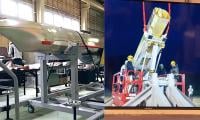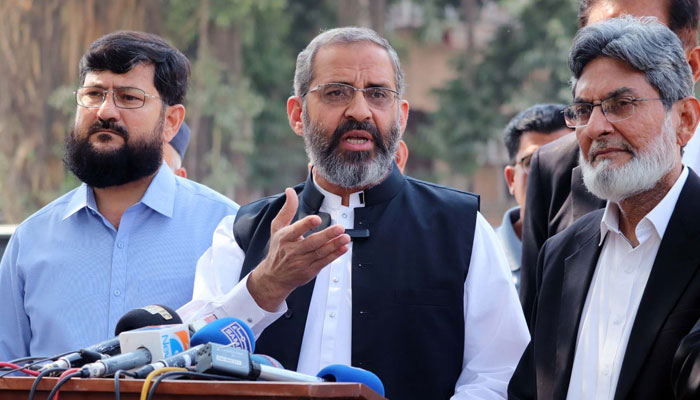JI approaches SHC for regulation of heavy traffic in city, compensation for accident victims
The Jamaat-e-Islami (JI) has filed petition with the Sindh High Court (SHC) seeking regulation of heavy vehicles’ movement in the city during day hours and payment of compensation to those who died or were injured in road accidents due to heavy vehicles.
The petitioners, Karachi JI Emir Monem Zafar and others, submitted in the petition that over 773 people lost their lives and more over 8,111 were injured in road accidents last year whereas 22 people were killed and 261 were injured within 10 days of January 2025 as per media reports.
They submitted that the Sindh governor had stated at a press conference that more than 50 recent accidents were caused by dumpers, water tankers, minibuses and trawlers. They said that heavy vehicles spread nuisance and there had been failure of the government to devise a doable traffic plan for freight trucks. They submitted that the government was not taking any action and all respondents were letting the citizens be sitting ducks on the roads. They stated the heavy vehicles were running on every lane like lunatics as if they had a licence to kill.
They submitted that police just checked the heavy vehicle and let them go without any fitness details. They said the provincial government and traffic police department had issued a notification restricting the movement of heavy vehicles within the city limits between 6am and 11pm but due to the failure of traffic police in implementing this restriction, heavy vehicles continued to operate in the city during the prohibited hours.
They submitted that another major contributing factor to road accidents was the poor maintenance of roads by the Karachi Metropolitan Corporation (KMC) despite the allocation of a total Rs10 billion for road maintenance and carpeting in Karachi.
They said that independent audit reports highlighted that less than 40 per cent of the allocated road maintenance budget was utilised effectively, raising serious concerns about mismanagement and misallocation of public funds by the KMC.
They submitted that the deplorable state of roads coupled with heavy vehicle movement had made Karachi’s road network highly unsafe, leading to frequent accidents, vehicle damage and increased commuting time for the public.
The petitioners submitted that the Sindh Injured Persons Compulsory Medical Treatment (Amal Umer) Act, 2019, was a legislative enactment that extended to the entire province and under the Act, the Sindh government was obligated to bear the expenses incurred for emergency medical treatment of injured persons, including victims of accidents and gunshot wounds, at any private hospital within the province.
The high court was requested to enforce the notification restricting heavy traffic movement from 6am till 10pm within the city limits, ensuring compliance through rigorous monitoring and legal action against violators, and direct the KMC to immediately undertake necessary road repairs and submit a detailed report regarding the utilisation of the allocated carpeting funds, specifying expenditures and pending projects.
The petitioners also requested the high court to direct the Sindh government to pay the fixed compensation to the families of the victims as well as ensure strict compliance with the Sindh Injured Persons Compulsory Medical Treatment (Amal Umer) Act, 2019, and bear the expenses for emergency medical treatment of injured persons, including victims of accidents and gunshot wounds, at all private and public hospitals within the province.
-
 Brooklyn Beckham's Wedding Dance With Mom Victoria Sparks Hilarious Memes
Brooklyn Beckham's Wedding Dance With Mom Victoria Sparks Hilarious Memes -
 King Charles' Latest Photos A Statement On His Health?
King Charles' Latest Photos A Statement On His Health? -
 Tom Cruise's Biggest Dream Crushed By The President?
Tom Cruise's Biggest Dream Crushed By The President? -
 King Charles, Queen Camilla Send Message To King Of Spain After Train Crash
King Charles, Queen Camilla Send Message To King Of Spain After Train Crash -
 'We Believe Brooklyn': David Beckham Trolled After Son's Statement
'We Believe Brooklyn': David Beckham Trolled After Son's Statement -
 Microsoft CEO Says AI Must Deliver Real World Impact To Survive
Microsoft CEO Says AI Must Deliver Real World Impact To Survive -
 Stranger Knocks, Then Opens Fire On Indiana Judge And Wife
Stranger Knocks, Then Opens Fire On Indiana Judge And Wife -
 Priscilla Presley's Derogatory Remarks On Late Daughter Lisa Marie Reignite Controversy
Priscilla Presley's Derogatory Remarks On Late Daughter Lisa Marie Reignite Controversy -
 Japan Unveils Anti-ship Missile With ‘barrel-roll’ Evasion To Outsmart Defenses
Japan Unveils Anti-ship Missile With ‘barrel-roll’ Evasion To Outsmart Defenses -
 How Brooklyn Beckham 'mentor' Prince Harry Inspiring Him To Speak Against Family?
How Brooklyn Beckham 'mentor' Prince Harry Inspiring Him To Speak Against Family? -
 Zac Efron, Kenny Ortega Revisit 'High School Musical' After 2 Decades
Zac Efron, Kenny Ortega Revisit 'High School Musical' After 2 Decades -
 Threads Overtakes X On Mobile Users: Here’s Why Everyone’s Switching
Threads Overtakes X On Mobile Users: Here’s Why Everyone’s Switching -
 Kanye West Eyes Performing First-ever Concert In India
Kanye West Eyes Performing First-ever Concert In India -
 Brooklyn Beckham's Claim About Nicola's Wedding Ordeal Gets Challenged
Brooklyn Beckham's Claim About Nicola's Wedding Ordeal Gets Challenged -
 AI Horror: 4 In 5 Young Workers Fear 'AI Could Replace Their Jobs', Says Report
AI Horror: 4 In 5 Young Workers Fear 'AI Could Replace Their Jobs', Says Report -
 Missouri Couple ‘locked Sons In Chicken Pen, Shot Them’ In Shocking Abuse Case
Missouri Couple ‘locked Sons In Chicken Pen, Shot Them’ In Shocking Abuse Case




